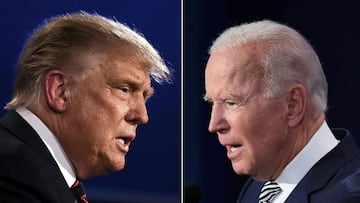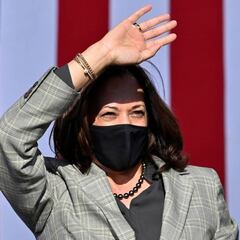Coronavirus Trump: Will he be available for the next presidential debate?
On 15 October, President Trump and former Vice-President Joe Biden are scheduled to meet for a town-hall style debate.

President Trump is now back at the White House after spending four days at Walter Reed Hospital, with just over a week to go there are concerns the President be physically fit to attend and about the safety of holding second presidential debate next week.
The low-down on the final presidential debate.
Is it safe for the debate to be held?
President Trump is continuing his treatment at the White House, but some are wondering if he will be physically ready to participate in the second presidential debate. At 74 and overweight, he already is in a higher risk group and the coronavirus has proven itself to be quite unpredictable, patients have been known to improve only to relapse. The President was given what some medical experts have referred to as a particularly aggressive treatment with a cocktail for which the side-effects aren’t known.
US coronavirus live: Trump out of hospital
Trump leaves hospital: is it risky to return to the White House?
Remdesivir treatment: how effective is it and how much does it cost?
Coronavirus USA: Donald Trump is taking the steroid drug dexamethasone – what is it?
Trump's inner circle who have tested positive for Covid-19
Why is Donald Trump considered a high risk patient?
Former Vice-President Joe Biden, although on the campaign trail now, has been taking the recommended precautions to avoid contracting the disease. However, Dr. Conley has dodged the question of when Trump first tested positive, so there is a worry that Trump may have been contagious at the first Presidential debate. Even though the two candidates were separated by roughly 12 feet, some studies have shown the virus to travel over 20 feet and the two shared the stage for 90 minutes with Trump often hurling his raised-voice attacks straight in the direction of Biden.
Changes have been made for the vice-presidential debates
Due to concerns over coronavirus, especially in light of President Trump’s recent stay in hospital, changes have already been agreed to for the vice-presidential debate. The candidates will be seated 12 feet apart instead of the original 7 feet, although according to Politico the Biden campaign had wanted the candidates to be standing. Also, a plexiglass barrier will separate the two candidates to prevent aerosol spread of coronavirus, although it is not expected that the two candidates will have such heated exchanges as there were in the debate between Trump and Biden.
What safety precautions will be put into place for the debate between Trump and Biden?
Related stories
Now that Trump is actively infected with the Covid-19 the concern is for both candidates’ safety. Typically, a Covid-19 positive person is asked to quarantine for 14 days, with the viral load that they shed depending on the severity of the infection. According to the CDC for serious infections lasting up to 20 days, but even as Dr. Conley the President’s personal physician said it can vary for different individuals being shorter or longer. So, whether or not Trump will even be able to attend is in question.
After the disastrous debate on 29 September, changes had already been suggested to restore some civility to the debates, such as switching off the microphones of the candidates if they failed to follow the rules. As reported in the New York Times, the debate commission is considering doing the debate via Zoom, the popular video conferencing app. However, they are in preliminary discussions and won’t be decided most likely until after the vice-presidential debate on Wednesday.

